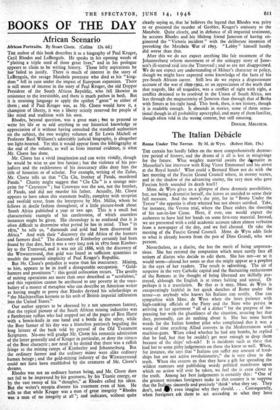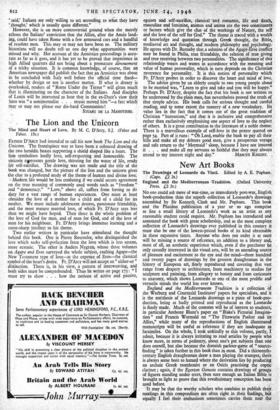The Italian Debacle
Rome Under The Terror. By M. de Wyss. (Robert Hale. 15s.) THE curtain has hardly fallen on the most comprehensively destruc- tive period of history, and the drama of it all is lost in misgivings for the future. What weighty material awaits the dgmatist in Mussolini's last interview with King Victor Emmanuel and his arrest at the Royal hands! What could a Bernard Shaw not do with the last meeting of the Fascist Grand Council where, in stormy scenes, and in the shadow of the advancing enemy, the very men who gave Fascism birth sounded its death knell!
Mme. de Wyss gives us a glimpse of these dramatic possibilities, but, not being a dramatist herself, she leaves us unaided to sense their full measure. And the more's the pity, for in " Rome Under the Terror" the appetite is often whetted but not always satisfied. Take, for instance, the Verona trial, where the Duce orders the shooting of his son-in-law • Ciano. Here, if ever, one would expect the authoress to have laid her hands on some first-rate material. Instead, we are presented with a cold academic account taken almost verbatim from a newspaper of the day, and we feel cheated. Or take the meeting of the Fascist Grand Council. Mme. de Wyss adds little to what is already known from the pen of Dino Grandi, who was present.
Nevertheless, as a diarist, she has the merit of being unpreten- tious. She has resisted the temptation which must surely face all writers of diaries who decide to edit them. She has not—or so it would seem—altered her notes so that she might appear as a prophet in the eyes of her readers. The result is refreshing. The air of suspense in the very Catholic capital and the fluctuating enthusiasms of the Romans at the thought of being liberated are skilfully por- trayed, although the English is at times halting and unreal. Or perhaps it is a translation. Be that as it may, Mme. de Wyss is exasperatingly faithful in her quick sketches of Rome under the terror—as anybody who knows his Italians can testify. One can sympathise with Mme. de Wyss when she loses patience with high-ranking officials of the Party and the State who persist in arriving at her apartment " all of a dither " for the purpose of im- pressing her with the ghastliness of the situation, assuring her that they, personally, can do nothing about it. She has some harsh words for the Italian bomber pilot who complained that it was a waste of time attacking Allied convoys in the Mediterranean with machine-guns. When asked whether he had any bombs, he replied that he had, but that he couldn't get near enough to drop them because of the ships' ack-ack! It is incidents such as these that lead her to some pithy judgements on those she knew so well. When, for instance, she says that " Italians can suffer any amount of hard- ships but are not active revolutionaries," she is very close to the truth. When she assures us that they have a gift for spreading the wildest rumours and publishing wordy political manifestos upon which no action will ever be taken, we feel she is even closer to the truth. Among her best judgements is certainly this: " One of the greatest mistakes foreigners make in this country is to suppose that the Italjgps sincerely and precisely ' think' what they say. They don't, and IP' t even imagine why they should. . . . Consequently, when foreignas ask them to act according to what they have
' said,' Italians are only willing to act according to what they have `thought,' which is usually quite different."
However, she is on more controversial ground when she merely echoes the Italians' conviction that the Allies, after the Anzio land- ing, could have taken Rome with a few armoured cars and a handful of resolute men. This may or may not have been so. The military historians will no doubt tell us one day what opportunities were missed and why. Her account of the Armistice proceedings is accu- rate as far as it goes, and it has yet to be proved that impatience in high Allied quarters did not bring about a premature denouement of a tricky situation. It is common knowledge, of course, that an American newspaper did publish the fact that an Armistice was about to be concluded with Italy well before the official time fixed— whether by design or not is another matter. If what is dreary is overlooked, readers of "Rome Under the Terror" will glean much ihat is illuminating on the character of the Italians. And disciples of Lenin will be interested to hear that in the ex-Duce's view their hero was "a sentimentalist . . . music moved him "—a fact which may or may not please our die-hard Communists!
STUART DE LA MAHOTIERE.































 Previous page
Previous page